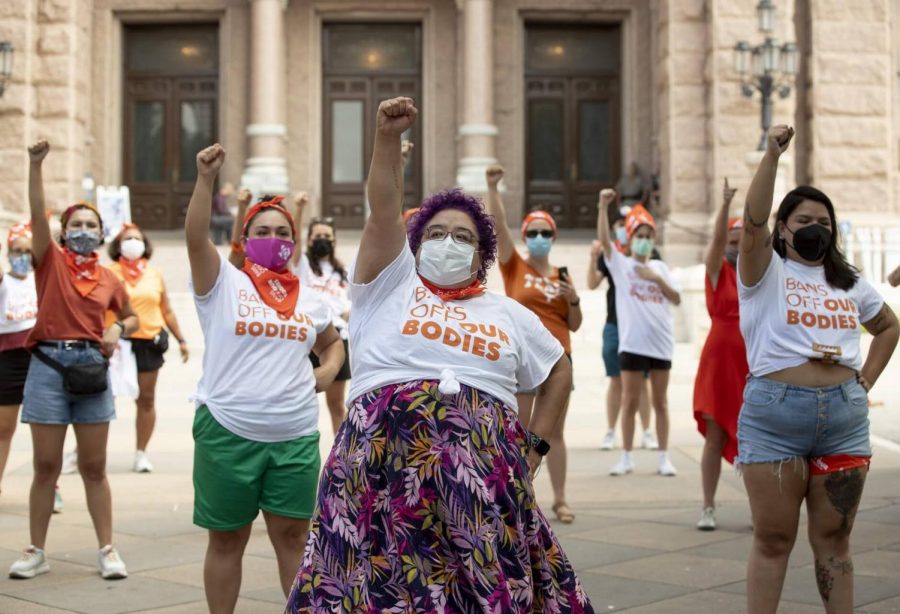Texas Abortion Bill Sparks Controversy Regarding Women’s Rights
Women protest Texas’ SB8 at the state Capitol in Austin on September 1.
September 25, 2021
On September 1, Texas Governor Greg Abbot signed Senate Bill 8 (SB8) into law. This law bans all abortions after a fetal heartbeat can be detected, which usually occurs 6 weeks into a pregnancy. According to experts, about 85% of all abortions usually performed in Texas are now illegal according to SB8; most women do not even know they are with-child until 6 weeks of a pregnancy have already passed.
SB8 makes no exceptions for rape, incest, or abuse, and grants citizens themselves the power to sue anyone who assists a woman seeking an abortion. Those who are successful in suing abortion providers will be awarded a bounty of at least $10,000.
“It’s sexist and disgusting,” says Alex Denning, a senior at Hingham High. “And quite honestly, the fact that anyone can sue a woman for a possible abortion, even their rapist, is an invasion of privacy.”
Essentially, the difficulty in blocking this harshly restrictive law lies in its novel details: since private citizens are the ones with the power to sue, not state or law officials, it is difficult for opponents of the law to challenge it in court, as a defendant cannot be pinpointed. This is why, thus far, SB8 has skirted the precedents set by Roe v. Wade, the Supreme Court’s landmark 1973 decision that established a woman’s constitutional right to an abortion before viability.
The new law in Texas has faced steep opposition from many. Not only does it severely restrict the rights of women, Rachel Rebouché, a law professor at Temple University, says it also disproportionately impacts women who lack the resources to travel out of state to circumvent the law and get an abortion–– mainly young women and women of color. Sadly, lower-class women, unable to financially support a child, are the ones most in need of abortion access.
Another criticism of the law is that it will lead to unsafe abortions. On Friday, as the House of Representatives debated the law, Representative Sylvia Garcia (D-Tex.) used a wire coat hanger as a prop and passionately argued that “[women] will not go back” to dangerous back-alley abortions.
In response to SB8, the House of Representatives passed H.R. 3755, the Women’s Health Protection Act, on Friday. It narrowly passed thanks to the Democrat majority in the House, with an almost even split of 218 to 211. H.R. 3755 was first introduced in 2013, and codifies Roe v. Wade by granting health-care providers the right to provide, and patients the right to receive, abortion services prior to fetal viability without limitations or uneccessary medical procedures. This would include obstacles such as ultrasounds, mandatory waiting periods, counseling, or two-trip requirements. The bill also legalizes abortions after fetal viability in cases where a continuation of the pregnancy would pose a risk to the patient’s health.
Despite the H.R. 3755’s success in the House, it faces steep opposition from the Senate and is unlikely to progress, making it more of a symbolic statement of solidarity by the House than anything else. According to CNBC, it is “nearly certain” that Senate Republicans will filibuster the bill, preventing it from continuing the process of becoming law. Opponents of H.R. 3755 claim it would allow more abortions later into a pregancy’s term and prevent states from passing safety regulations for abortions. However, the majority of Americans support legalizing abortion, according to a recent poll by Monmouth University. The White House said on September 20 that it “strongly supports” H.R. 3755, and “will not allow this country to go backwards on women’s equality.”
More opposition to Texas SB8 has come from a coalition of pro-choice organizations, including the American Civil Liberties Union and Planned Parenthood. The coalition poses the question of “whether a state can insulate from federal-court review a law that prohibits the exercise of a constitutional right by delegating to the general public the authority to enforce that prohibition through civil actions.”
Last month, these groups requested that the Supreme Court rush the trial process and address their questions regarding the constitutionality of SB8 before receiving a ruling from the U.S. Court of Appeals for the 5th Circuit. The 5th Circuit will not hold a hearing until at least December, which is why the coalition requests that the Supreme Court make a special exception to block the law.
Hingham High Senior Charlotte Andrews agrees, stating, “I think that Texas is making decisions that go against the laws that the federal government already has in place so the federal government or a higher authority should be taking action and stepping in.”
However, the Supreme Court ruled 5-4 that they will not rush the process on procedural grounds, and will not address the constitutionality of the law in Texas until they get a ruling from the Court of Appeals for the 5th Circuit.
Already, the ramifications of Texas’s precedent are making themselves apparent. Since SB8 became law, Florida state Rep. Webster Barnaby filed House Bill 167, which allows private citizens to file lawsuits against abortion providers after six weeks of a pregnancy. Ten other states have also indicated intentions to introduce bills similar to Texas’, according to NARAL Pro-Choice America.


































